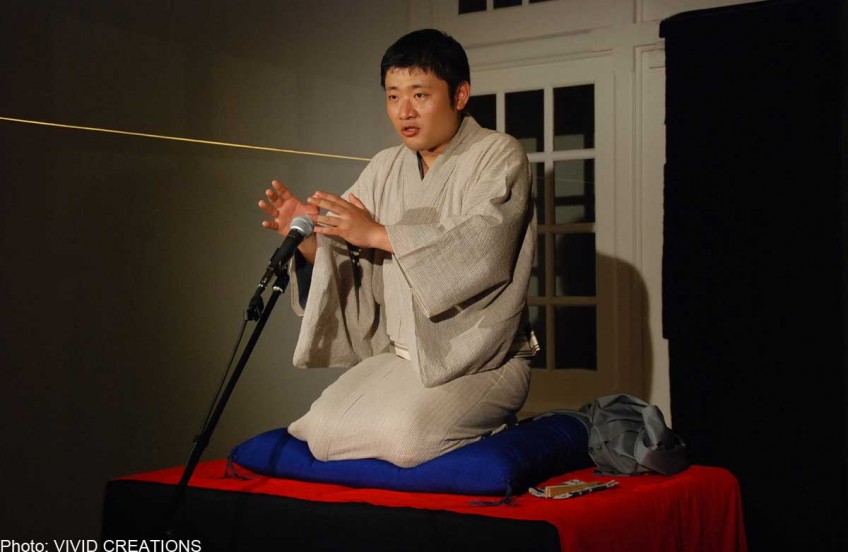Japanese minimal comedy

In rakugo, a man or woman narrates a comical story - sometimes with the help of a fan or handkerchief as a prop - while sitting on a bare stage.
The minimalistic set-up, which allows room for imagination, was what attracted Japanese comedian Shinoharu Tatekawa to rakugo, a form of Japanese verbal entertainment which dates back to the 18th century.
"At my first rakugo show, the characters came alive in my mind, as if I had read a great novel. But unlike a good book, rakugo is special because it is found only in Japan," Shinoharu, who is usually referred to by his first name, tells Life! in fluent English.
The 37-year-old is staging a two-day show at YMCA Singapore on Thursday and June 20, performing rakugo in Japanese on the first night and in English the next.
A show usually consists of three or four stories which make fun of ordinary people and their flaws, such as those who are greedy, easily jealous or like to pretend to be someone they are not, says Shinoharu.
They are told as a dialogue involving two or more characters, differentiated by the storyteller with a slight turn of the head and change in pitch and tone.
A Yale University graduate who majored in East Asian studies, he quit a job in marketing at Japanese general trading company Mitsui & Co to pursue a career in rakugo about 12 years ago. He spent eight years training under rakugo master Shinosuke Tatekawa.
"My parents were angry at first because they believed it wasn't a stable job, and it was impossible for me to become a professional at 26," recalls Shinoharu, whose real name is Ittetsu Kojima.
His stage name Shinoharu, which means spirit of spring, was given to him by his master. He adopted his master's last name, like his peers.
He explains that many aspiring performers started performing in high school rakugo clubs. He adds that he did not expect the apprenticeship to be so long.
"I had to do chores such as cleaning, cooking, driving and picking up my master's laundry," he says. "He doesn't teach. The idea is to go to his performances and learn or steal his techniques by watching."
However, Shinoharu was convinced that performing rakugo was his calling and his patience has paid off.
He started performing independently in Japan in 2011. That year, he was invited to perform in Singapore by events management company Vivid Creations.
Vivid brought him back twice last year and is the organiser of his upcoming show too.
A Vivid Creations spokesman says Shinoharu is sought after for his ability to perform in English because it means the non-Japanese can enjoy a rakugo performance without the use of a translator or subtitles, which may dilute the comedic moments.
Shinoharu, who is married with no children, writes and translates the English scripts he uses. He says it is exciting to perform in English.
He adds: "I received different reactions from the audience here compared with in Japan. They laughed a lot more. When I tell a funny but touching story, some even cried. In Japan, the crowd is more reserved - even if it enjoys the show, it rarely shows it."
The challenge is to find stories which remain funny after translation because many contain puns which are impossible to translate. He has written a few to appeal to English-speaking audiences in Singapore, but says classical stories with universal humour work better, because he does not know the local culture well enough.
He hopes to see more young adults at his upcoming show. His previous shows in Singapore attracted mostly people in their late 20s and 30s, with a turnout of 250 to 280 people on average.
"There is a misconception that rakugo is meant for older people. It is really something that anyone can enjoy, as long as they like to imagine," he says.
This article was published on June 13 in The Straits Times.
Get a copy of The Straits Times or go to straitstimes.com for more stories.
elricat@sph.com.sg